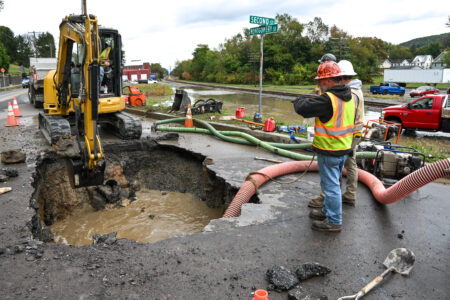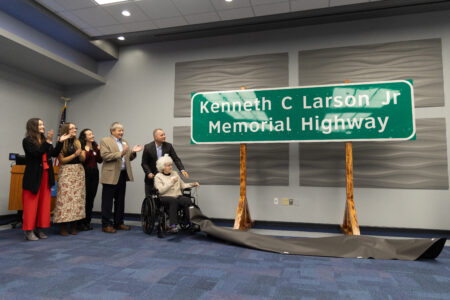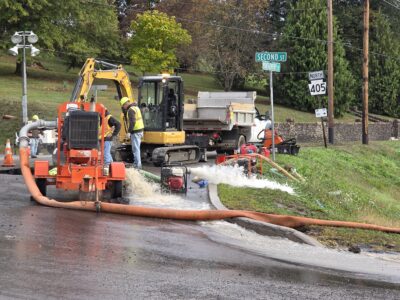Woman seeks seat on Williamsport city council in November
The race for Williamsport City Council is one of the more important in the Nov. 4 General Election.
There are three open seats — with Councilman Randall J. Allison Jr. choosing not to run — and five candidates vying for the spots.
Council, in a third-class city code and strong mayor form of government, serves as the legislative branch of the government. It holds meetings at the Trade and Transit Centre II building as City Hall at 254 W. Fourth St., remains closed for public use.
The candidates are: Democrats Liz Miele, an incumbent, April Line and Jonah Milliken. Republicans include incumbent Eric Beiter and David J. Dussinger.
The candidates were each asked similar questions by the Sun-Gazette. Line’s answers follow.
Q. What do you see as ways to increase revenue and lower expenses as the city faces a projected deficit of at least $3 million or higher in 2026?
“This is a complicated question because the rules are specific and unfortunately limited for a third-class city, so we are only able to increase revenue by increasing property taxes, and Williamsport’s property taxes are already among the highest in Lycoming County,” she said.
“As a homeowner in the city, I am nervous about my property taxes increasing when all of the other costs are also increasing,” she said.
“I know the current serving members of city council are, ostensibly, looking at instituting a home rule charter to help answer this question, however, that is a process that will take a minimum of two years, and requires buy-in from the voters of Williamsport as well as an elected review board to do a study,” Line replied.
“Not in time for the 2026 budget year – one of the possibilities with a home rule charter is that we can raise revenue in other ways, so long as they are permissible in the constitution of Pennsylvania,” she said.
“Another thing I know the current members of council are talking about is contracting with the state police to serve Williamsport and doing away with the Williamsport Police Department,” Line said.
“There are several problems with that: The police are represented by a union, and negotiate a contract two years at a time, so I’m also fairly sure this wouldn’t happen in time for the 2026 budget year, either, and, in listening to the people who live here, many of them are concerned about crime,” she said.
“Also, I do not know what it would cost to contract with the state, but I would be very surprised if it is millions of dollars less,” she stated.
“I think the solution to the budget deficit has to be multi-pronged and is going to involve some austerity measures like reviewing effectiveness of city departments and adjusting for efficiency and cost and, yes, possibly increased property taxes, continued grant seeking by the administration as well as continued best practices for budgeting and working for the best interest of everyone in Williamsport by recognizing that the job of a government is not to make money or to profit.” Line stressed.
“It is to provide for the safety of its citizens and the infrastructure that makes life, work, commerce, education, possible,” she noted.
“We are going to need to take a long range view and to be realistic,” she said, adding that in a budget of $32 million, $3 million is not that huge a number.”
“And we are going to solve it over time with adjustments across the board. Mayor (Derek) Slaughter’s administration has already been working toward this goal, even before working with the state-funded consultants who are, as I write this, cooperating with the administration to come up with options to solve the deficit,” she said.
Meanwhile, she added, “the city could also take a chunk out of the deficit by making a decision about city hall (there was an offer to purchase it for $600,000) and then the city could stop paying rent to Trade and Transit for all of the various buildings it is currently inhabiting that are not ideal.”
“Furthermore, several costly studies have been authorized by city council and have determined that the city hall building would cost orders of magnitude more to repair and bring up to Americans with Disabilities Act (ADA) standards than would building a new city hall and police barracks,” she said.
“Williamsport can get help with the costs to build a new City Hall from the state, but it cannot get help from the state to renovate City Hall because it makes zero financial sense to invest more money in a building than it will ever be worth, which is the situation we are looking at,” according to Line.
“There are also ongoing costs to the city for City Hall to sit empty, which would be eliminated on its sale,” she remarked.
“At one of the early City Council meetings I attended as a candidate, they authorized payment of $20,000 to Fish Real Estate for services related to selling City Hall, which the current council has refused to do,” Line said.
“There are a lot of vacant commercial buildings within city limits that, if they housed businesses that employed people and made money, would also bring money into the city budget via the work privilege and gross receipts taxes,” Line said.
“More businesses in town would also provide jobs for folks who need them and make Williamsport a better place to live and work. Which is a nice segue into the next question,” she observed.
Q. What way can the city improve its codes enforcement and ensure money invested for residential, commercial and industrial blight mitigation happens?
“Blight is usually the result of people in poverty or commercial neglect,” Line said.
“I can see that this administration is taking blight elimination seriously by looking around me, and I have learned at City Council meetings that the Redevelopment Authority has been working really hard on the project of blight in Williamsport,” she added.
“All kinds of important stuff is happening on both residential and commercial sides of the issue. Off the top of my head, I am aware of two houses that have been built on sites of formerly blighted properties, and I know Habitat for Humanity is active in our area and currently seeking income-qualified home buyers. The part of Benji’s over on Washington Boulevard that is being demolished is a good commercial example of progress,” Line said.
“I do think our specific codes department could be improved, and I think it would be helpful for codes to work cooperatively with social services because I know there are some folks in really terrible situations in our city who need help, not nastygrams from codes because of their overgrown yard or out-of-control vegetation,” Line stated.
“Enforcement seems to be extremely uneven and based on neighbors reporting on neighbors rather than any kind of schedule of patrol,” she said.
“To me, it’s inhumane to use codes enforcement to exacerbate problems for people with disabilities or in extreme poverty. It’s especially inhumane when we allow commercial buildings to crumble before our eyes for years, and not hold monied owners accountable to caring for their properties or their communities.”
“If I were in charge of codes, I would make sure all of the enforcement officers got up-to-date training, and I would create a patrol schedule for the entire city,” she said.
“I would institute a cooperative with STEP to, when approaching a home that is in disrepair, assess the human situation inside and, if warranted, offer assistance first. Keeping people in their homes by supporting them in accessing resources that are available to them is much better for our city and communities than using codes violations to make terrible situations worse. I would also strengthen enforcement and penalties on commercial property owners, especially those whose violations create safety hazards,” she said.
“When I am elected to city council, I will not be in charge of codes, so what I think about how they can be improved is more or less irrelevant, but I would absolutely vote in favor of any initiatives brought before that body to make codes better in the ways outlined above,” Line said.
“While codes enforcement is germane to preventing blight, it doesn’t have much to do with how funds get allocated,” she said.
“I believe that the current administration’s Department of economic and community development and grants compliance offices are doing a great job at making sure grant funding is spent on what it is supposed to be spent on, and reporting that properly,” Line said.
“Our city has clean audits for the last three years, and as much as, when I started this journey of running for council, I knew there are problems in this city, I have been elated to learn that most of the folks serving in our city’s government see the same opportunities I do and are working toward them already. So what I bring to the table is support, affirmation, and willingness to show up and do the work,” she said.




